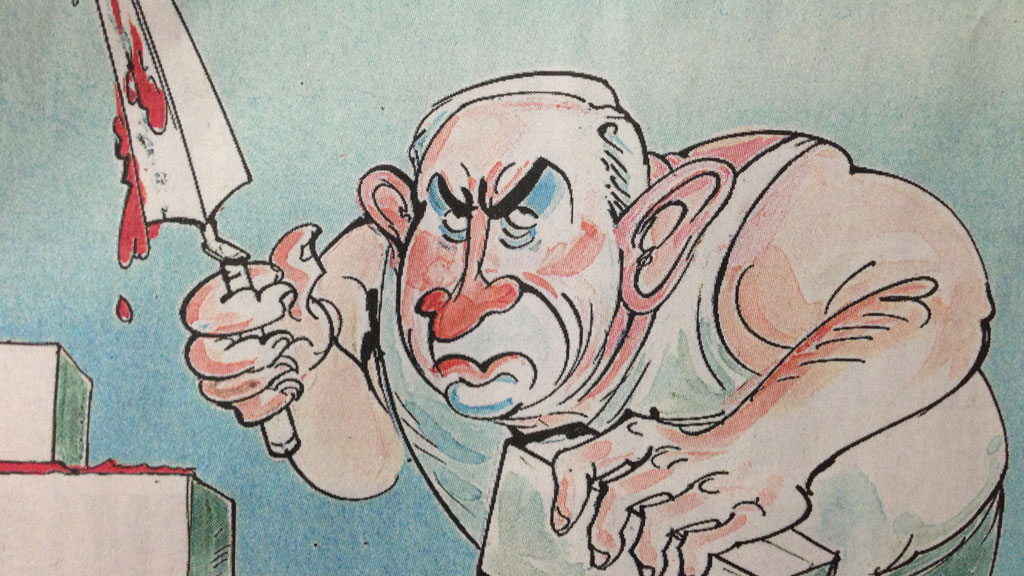Scarfe apologises after Israel cartoon furore
Offensive, provocative or anti-Semitic? Gerald Scarfe apologises over the timing of his Sunday Times cartoon, but insists his sketch was a criticsm of Israel’s prime minister – not the Jewish people.

Appalling, outrageous, a deliberate echo of “blood libel” imagery. A single cartoon, published in this weekend’s Sunday Times, triggered a storm of outrage from Jewish groups in the United Kingdom and Israel.
The Board of Deputies of British Jews lodged a complaint with the Press Complaints Commission, while the speaker of the Israeli parliament, Reuven Rivlin, wrote to his British counterpart John Bercow to express his outrage.
“For me and other Israelis, this cartoon was reminiscent of the vicious journalism during one of the darkest periods in human history,” he wrote. He insisted that while he was not trying to control the media or restrict freedom of speech, many Israelis feared it was “testimony to sick undercurrents in British society”.
The Israeli ambassador to London, Daniel Taub, accused the Sunday Times of crossing “a red line”, while former prime minister Tony Blair criticised the timing – the cartoon was published on Holocaust memorial day, when services are held across the country to remember the millions who died at the hands of the Nazis.
Crossing a red line?
So what was all the fuss about? The Gerald Scarfe sketch showed the Israeli Prime Minister Binyamin Netanyahu brandishing a dripping knife, while sitting astride a wall made up of what looks like Palestinian blood. The caption: “Will cementing the peace continue?”
Critics declared that the cartoon clearly referenced the long-standing myth that Jews use human blood in their religious rituals: it made talk of fighting anti-semitism seem irrelevant, they said.
In the end, News Corp boss Rupert Murdoch took to Twitter to issue a rare apology.
Gerald Scarfe has never reflected the opinions of the Sunday Times. Nevertheless, we owe major apology for grotesque, offensive cartoon.
— Rupert Murdoch(@rupertmurdoch) January 28, 2013
The Sunday Times editor Martin Ivens, who must have been having a rather eventful first week in the job, met leaders from the Jewish community on Tuesday, and told them: “I’d like to apologise unreservedly for the offence we clearly caused. This was a terrible mistake.”
But not all Israelis were outraged by the image. Haaretz reporter Anshel Pfeffer insisted the cartoon was not anti-Semitic by any standard: it was neither directed at Jews, nor contained any holocaust imagery.
“Should the Sunday Times have not published the cartoon on International Holocaust memorial day? Only if one believes that is a day in which Israeli politicians have immunity from being caricatured,” he wrote.
And Nissim “Nusko” Hezkihayu, one of Israel’s best known caricaturists, went on Army Radio to defend Gerald Scarfe. “(He) doesn’t just make fun of Bibi but of many politicians, and he treats them all disrespectfully. if you look at the other caricatures, Bibi came off easily.”
This drawing was a criticism of Netanyahu, and not of the Jewish people: there was no slight whatsoever intended against them. Gerald Scarfe
Others say they regret the way that criticism of Israeli policies is automatically condemned as anti-semitism. Journalist Alon Aviram, who writes for the left-of-centre Israeli website +972, told Channel 4 News that he found it rather disconcerting that a satirical sketch was being interpreted as an attack on the Jewish community.
He said it was “tenuous to equate it to imagery of blood libel: you have to put it into context with the other work Scarfe does. His sketches of Assad and Tony Blair and other public figures certainly include plenty of blood.”
Scarfe responds
Aviram said that to accuse the Sunday Times of misjudgement by printing the cartoon on Holocaust memorial day would imply that there had been some sort of anti-Semitic intent behind the drawing. “Anyone would find it ludicrous to propose that Israeli policy makers can’t be criticised on that day,” he said.
Many Israelis are frustrated that attempts to criticise the Likud government and its policies are all too often dismissed as anit-Semitism. But according to Aviram, “that line which is constantly played out is somehow losing its capital among the Jewish diaspora.”
In a statement on his website, Gerald Scarfe insisted: “I am not and never have been, anti-Semitic. The Sunday Times has given me the freedom of speech over the last 46 years to criticise world leaders for what I see as their wrong-doings.”
“This drawing was a criticism of Netanyahu, and not of the Jewish people: there was no slight whatsoever intended against them. I was, however, stupidly completely unaware that it would be printed on Holocaust Day, and I apologise for the very unfortunate timing.”